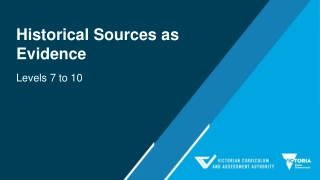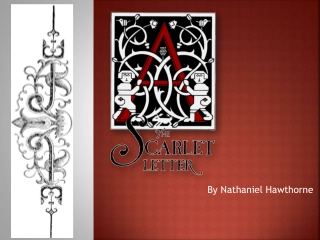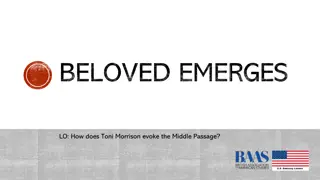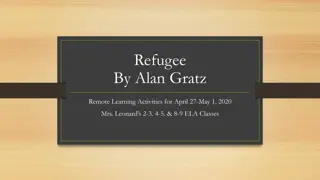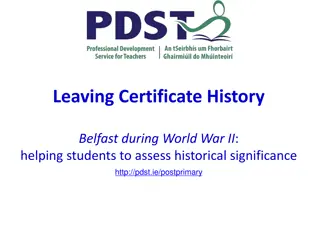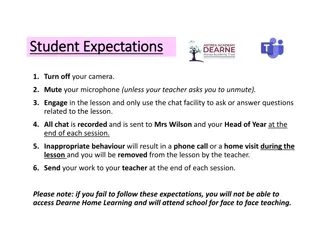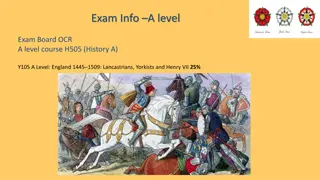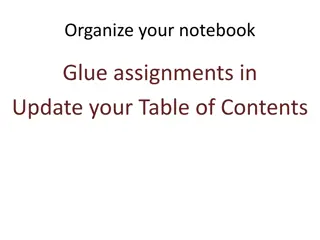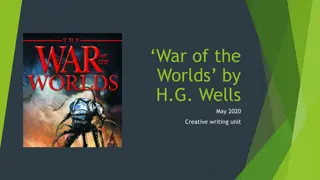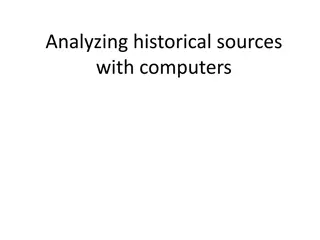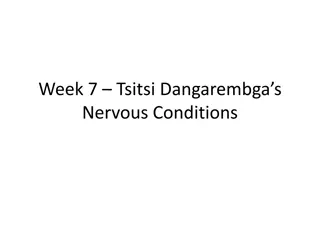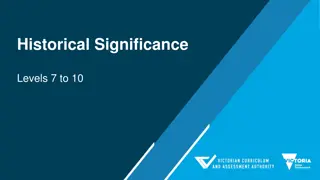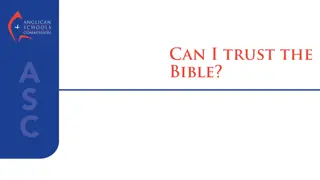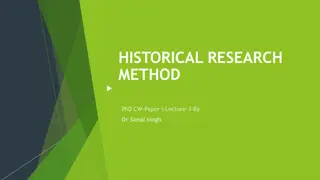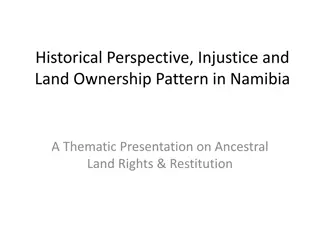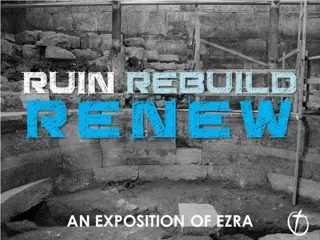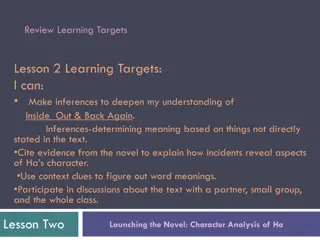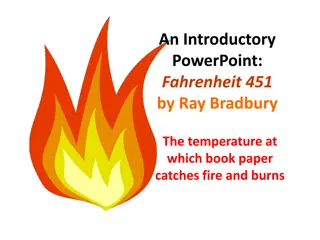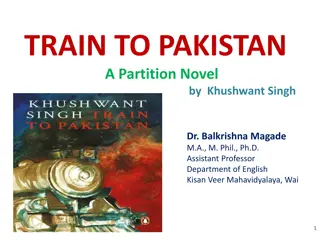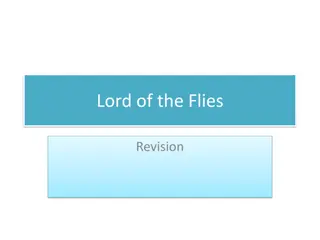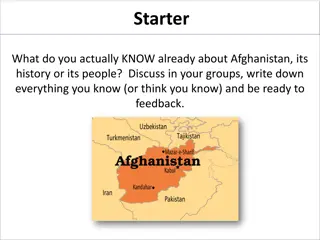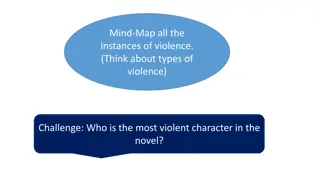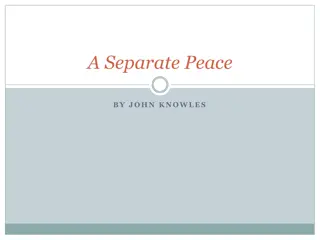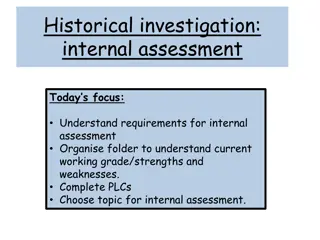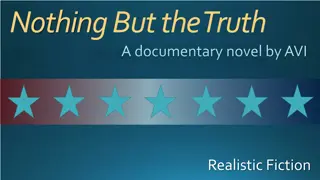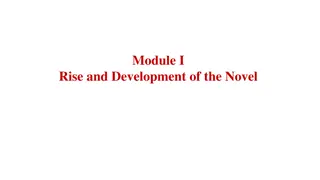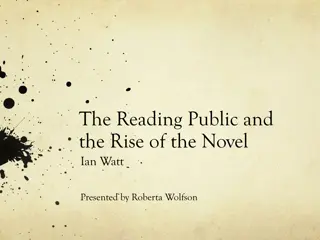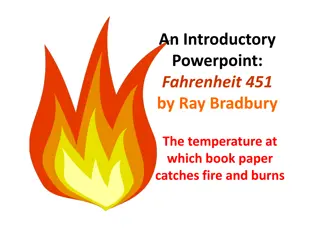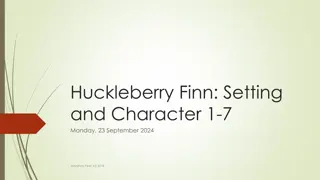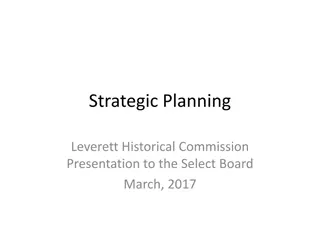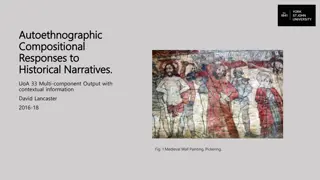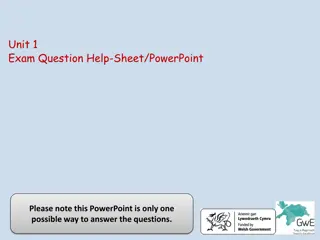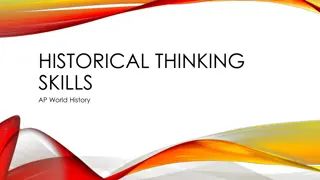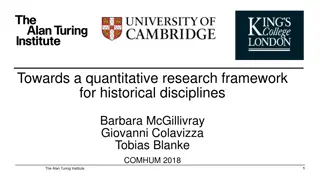Historical Sources as Evidence
Explore the importance of historical sources as evidence in the Victorian Curriculum History context, focusing on how students analyze, evaluate, and utilize sources to create historical explanations and arguments. Discover the significance of primary and secondary sources, perspectives of historica
1 views • 46 slides
Notification of Ministry of Public Health on Novel Food Regulations
This notification outlines the Ministry of Public Health's regulations on novel foods, including definitions, requirements, and examples. It also discusses food categories such as food supplements and special purpose foods, highlighting the importance of health-conscious consumer trends and the pote
2 views • 23 slides
Insights into Nathaniel Hawthorne's Novel: The Scarlet Letter
Delve into the background of Nathaniel Hawthorne and his connection to Salem, Massachusetts, as well as the Puritan past that heavily influences his renowned novel, The Scarlet Letter. Discover intriguing facts about colonial Massachusetts laws and how this classic novel came to be, capturing the es
0 views • 42 slides
Challenges and Solutions in Implementing Historical Competencies in Teaching
Explore the complexities and obstacles faced in implementing historical competencies in teaching, as discussed by Jens Aage Poulsen, a senior lecturer and researcher at HistoryLab, University College Lillebaelt, Denmark. The content delves into competence-based curriculum, core historical competenci
0 views • 7 slides
Examining Water Imagery in Toni Morrison's "Beloved" and Its Contextualization with Historical Events
Toni Morrison skillfully evokes the harrowing Middle Passage experience in "Beloved" through water imagery, symbolizing themes of cleansing, rebirth, and trauma. By comparing the water symbolism at various points in the novel, readers can explore its significance in relation to historical events lik
6 views • 14 slides
Refugee Novel Remote Learning Activities for ELA Classes
Mrs. Leonard's ELA classes are engaging in remote learning activities centered around the novel "Refugee" by Alan Gratz. The students are following a weekly schedule, reading assigned chapters, listening to the audio book, and completing related assignments on TEAMS. Detailed instructions and links
0 views • 12 slides
Exploring Historical Significance of Belfast During World War II
Assisting students in assessing the historical significance of Belfast during World War II through an enquiry-focused approach. The content covers key aspects such as the impact of World War II on Belfast, its strategic importance, political leadership, the Belfast Blitz of 1941, and key terms relat
0 views • 32 slides
Student Expectations and Novel Study Activities
Guidelines for online learning set by Mrs. Wilson including camera and mic use, chat conduct, and consequences for inappropriate behavior. Additionally, tasks related to the novel involving definitions of anarchy, primal, savagery, civilization, and democracy, a reflection on leadership, and an exce
1 views • 13 slides
Wars of the Roses (1445-1461): Source Analysis on the Downfall of Henry VI
This content delves into the Wars of the Roses period (1445-1461) in England, focusing on the outbreak of conflicts, political turmoil, and the downfall of Henry VI. It includes an inquiry topic, sample paper question, and a detailed analysis of a historical source (Source A) by Jack Cade regarding
0 views • 16 slides
Exploring Historical Fiction: Elements and Examples
Discover the essence of historical fiction, its key elements, and examples like "Forrest Gump." Learn how plausibility and interpretation play pivotal roles in creating captivating narratives that blend fiction with historical events.
0 views • 11 slides
The Impact of H.G. Wells' War of the Worlds on Popular Culture
H.G. Wells' iconic novel, War of the Worlds, explores themes of fear, imperialism, and the unknown. Published in 1898, it remains a timeless science fiction adventure, inspiring multiple adaptations in various media. Explore the historical context, the novel's lasting influence, and its adaptation i
0 views • 26 slides
Exploring Historical Analysis with Digital Tools
Delve into the world of historical analysis using digital methods like digitization, metadata, OCR, and balancing challenges. Discover how tools like Antconc can aid in machine-driven inquiries, statistical analysis, and more to extract valuable insights from historical sources.
0 views • 13 slides
Exploration of Gender and Sexuality in Tsitsi Dangarembga's "Nervous Conditions
Tsitsi Dangarembga's novel "Nervous Conditions" introduces a powerful narrative that focuses on the lives of young African girls and women in Zimbabwe during the postcolonial era. The novel challenges traditional gender roles and explores themes of sexuality, identity, and societal expectations. Thr
0 views • 11 slides
Understanding Historical Significance in Victorian Curriculum History
Exploring historical significance levels 7 to 10 in the Victorian Curriculum History, this content delves into the importance of evaluating the past, identifying patterns of change, and assessing the influence of individuals and groups. Students learn to analyze causes, effects, motives, and interpr
0 views • 48 slides
Examining the Reliability of Historical Texts: From The Bible to Socrates
Investigating the unparalleled popularity of the Bible, the historical significance of Christianity, the reliability of documents related to Socrates, and the critical analysis of potential mistakes in historical texts through comparisons and archaeological findings.
2 views • 13 slides
Understanding Historical Research Methods
Historical research is a systematic approach to investigating past events, developments, and experiences. It involves critical examination of evidence, interpretation of sources, and tracing of historical trends to gain insights into social changes. Various definitions by scholars like Kerlinger, Wh
1 views • 21 slides
Understanding Historical Research: Methods, Purposes, and Aims
Historical research involves investigating past events systematically to provide a dynamic explanation, interpretation, and understanding of the past. It aims to uncover unknown aspects, answer unexplored questions, and link past happenings to the present to enrich human culture and encourage interd
0 views • 20 slides
Namibia's Ancestral Land Rights: Historical Injustice and Restitution
Explore the historical context of land ownership in Namibia, focusing on ancestral land rights, colonization processes, and the impact on indigenous populations. Learn about the notion of ancestral land, who should be considered indigenous, and the colonial modes of land acquisition. Uncover the str
0 views • 33 slides
Overview of Ezra: Historical Background and Key Details
Ezra and Nehemiah, two significant books written as one scroll in Hebrew, cover a historical period from 538-445 BC in Israel's history. The authorship of Ezra is traditionally attributed to both Ezra and Nehemiah, possibly also linked to the Chronicles. This period coincides with other biblical boo
0 views • 31 slides
Exploring Character Analysis and Novel Structure in 'Inside Out & Back Again' Lesson 2
Delve into character analysis of Ha in the novel "Inside Out & Back Again," focusing on making inferences, citing evidence, and using context clues to understand the character deeply. Engage in discussions and activities to uncover the complexities of Ha's personality. Analyze the unique text struct
0 views • 39 slides
Insights into Fahrenheit 451 by Ray Bradbury
Explore the influential novel Fahrenheit 451 by Ray Bradbury, delving into its origins, themes, and relevance in the context of societal criticism, dystopian elements, and historical backdrop of the 1950s. Discover the cautionary tale of censorship, technological advancements, and the impact of tota
0 views • 16 slides
Khushwant Singh: Life and Works - Train to Pakistan Novel Summary
Khushwant Singh, a renowned writer and columnist, was born in 1915 in Haladi (now in Pakistan) and educated in Delhi and Lahore. He authored several books, including "Train to Pakistan," a novel on the partition. The novel, published in 1956, depicts the impact of the partition on Mano Majra, a fict
0 views • 33 slides
Exploring Themes and Context in "Lord of the Flies" Revision
This revision guide delves into the themes, characters, symbolism, and context of William Golding's "Lord of the Flies." It explores the interplay of leadership, democracy, good vs. evil, civilization, and savagery within the novel's historical and political background. Through analyzing the charact
1 views • 29 slides
Exploring Afghanistan: History, People, and Conflict in The Kite Runner
Uncover the rich tapestry of Afghanistan's history, people, and conflicts as depicted in Khaled Hosseini's novel, "The Kite Runner." Delve into the author's background, the novel's themes, and the importance of understanding the geographical, ethnic, and religious diversity of the region. Research k
0 views • 110 slides
Exploring Violence in the Novel: Characters, Themes, and Society
Violence in the novel is depicted through physical, psychological, and emotional means, highlighting the harsh realities faced by the characters. The analysis delves into the characters' violent tendencies, societal acceptance of violence on the ranch, and the complex dynamics between characters lik
0 views • 4 slides
A Separate Peace by John Knowles - Overview and Analysis
A Separate Peace by John Knowles is a compelling coming-of-age novel set in 1942 at an elite boarding school in New Hampshire during WWII. The story follows the protagonist, Gene, as he navigates complex relationships with his best friend Finny and other classmates amidst internal and external confl
0 views • 35 slides
Requirements for Historical Investigation Internal Assessment
Understand the 25% weightage internal assessment comprising 3 sections for a historical investigation. Focus on source evaluation, investigation, and reflection within a 2,200-word limit. Choose a historical topic, analyze primary and secondary sources, and consider causation, consequence, continuit
0 views • 18 slides
Nothing But the Truth: A Documentary Novel by AVI
A realistic fiction novel, "Nothing But the Truth" by AVI, delves into the themes of responsibility, rumors, media influence, and the elements of fiction. Through a documentary-style approach, it explores the dynamics among students, teachers, schools, and the complexity of truth in society, sheddin
0 views • 21 slides
Understanding Historical Context in Skills Development Discourses
Exploring the evolution of apprenticeship and skills development through historical sociology, historical futures, modes of justification, and complexity concepts. Emphasizing the importance of nuanced historical understanding to navigate contemporary challenges in South Africa's skills development
0 views • 29 slides
Evolution of the Novel: From Medieval Romances to Elizabethan Fiction
The evolution of the novel traces back to the Medieval period with the rise of Anglo-Norman romances and the foundation of English prose. The transition through the 15th and 16th centuries saw the emergence of notable works by authors like Chaucer, Caxton, Sidney, and Milton, shaping the novel into
0 views • 20 slides
The Rise of the Novel: An Overview of the 18th Century Reading Public
The essay explores the conditions that led to the rise of the novel in the 18th century, focusing on the limited literacy, economic challenges, and social stigma that influenced the reading public. It delves into the roles of different subgroups like women and the middle class, as well as the commer
0 views • 10 slides
Fahrenheit 451: Exploring Themes and Historical Context
Explore the themes of censorship, totalitarianism, and social criticism in Ray Bradbury's Fahrenheit 451. Delve into the historical context of the 1950s, a time marked by post-World War II anxieties, technological advancements, and the specter of nuclear war. Discover how the novel warns against the
0 views • 20 slides
Exploring Themes and Characters in "Huckleberry Finn": A Historical Perspective
Delve into Mark Twain's classic novel, "Huckleberry Finn," set against the backdrop of the early 19th-century Pioneer America. Discover the intricate character dynamics of Huck and Tom Sawyer, as they navigate themes of innocence, social systems, and the clash between nature and society. Uncover the
0 views • 12 slides
Leverett Historical Commission Strategic Planning Presentation Overview
Leverett Historical Commission identifies issues with ad hoc requests, lack of clarity on historical property significance, and inadequate maintenance plans. A strategic plan is needed to define assets, determine significance, create guidelines, prioritize restoration efforts, and establish funding
0 views • 9 slides
Analysis of Virginia Woolf's Novel "To the Lighthouse
Explore the themes, characters, and narrative structure of Virginia Woolf's novel "To the Lighthouse." Learn about the author's life, writing style, and key facts regarding the novel's publication. Delve into the three parts of the story, focusing on the Ramsay family dynamics and the character of L
0 views • 16 slides
Exploring Historical Narratives through Music and Art
This submission presents two original compositions that delve into historical narratives through a unique blend of music and visual art. The compositions aim to reinterpret stories from the past, creating innovative structures and forms. By intertwining various perspectives and utilizing cinematic t
0 views • 8 slides
Historical Source Analysis Exam Questions Overview
The provided content outlines exam questions related to historical sources, guiding students on analyzing, evaluating, and interpreting information from different sources. The questions cover a range of topics such as learning from sources, assessing accuracy, understanding significance, and making
0 views • 12 slides
Developing Historical Thinking Skills in AP World History
AP History classes aim to cultivate apprentice historians by fostering historical thinking skills (HTS). These skills include Chronological Reasoning, Comparison and Contextualization, Crafting Historical Arguments, and Historical Interpretation. Each skill set equips students with the ability to an
0 views • 15 slides
Quantitative Research Framework for Historical Disciplines
Scholarly communities in historical disciplines are combining quantitative and qualitative methods to study phenomena that change over time. The proposed general methodological reflection aims to enhance research in historical linguistics through quantitatively driven models and claims. Quantitative
0 views • 18 slides
Explore Lost Horizon: A Novel Study Unit
Dive into the world of "Lost Horizon" by James Hilton, a novel written during the Great Depression. Discover the hidden paradise of Shangri-La and the impact of historical events on the author's vision. Unveil the themes of hope and utopia amidst a backdrop of uncertainty.
0 views • 21 slides
